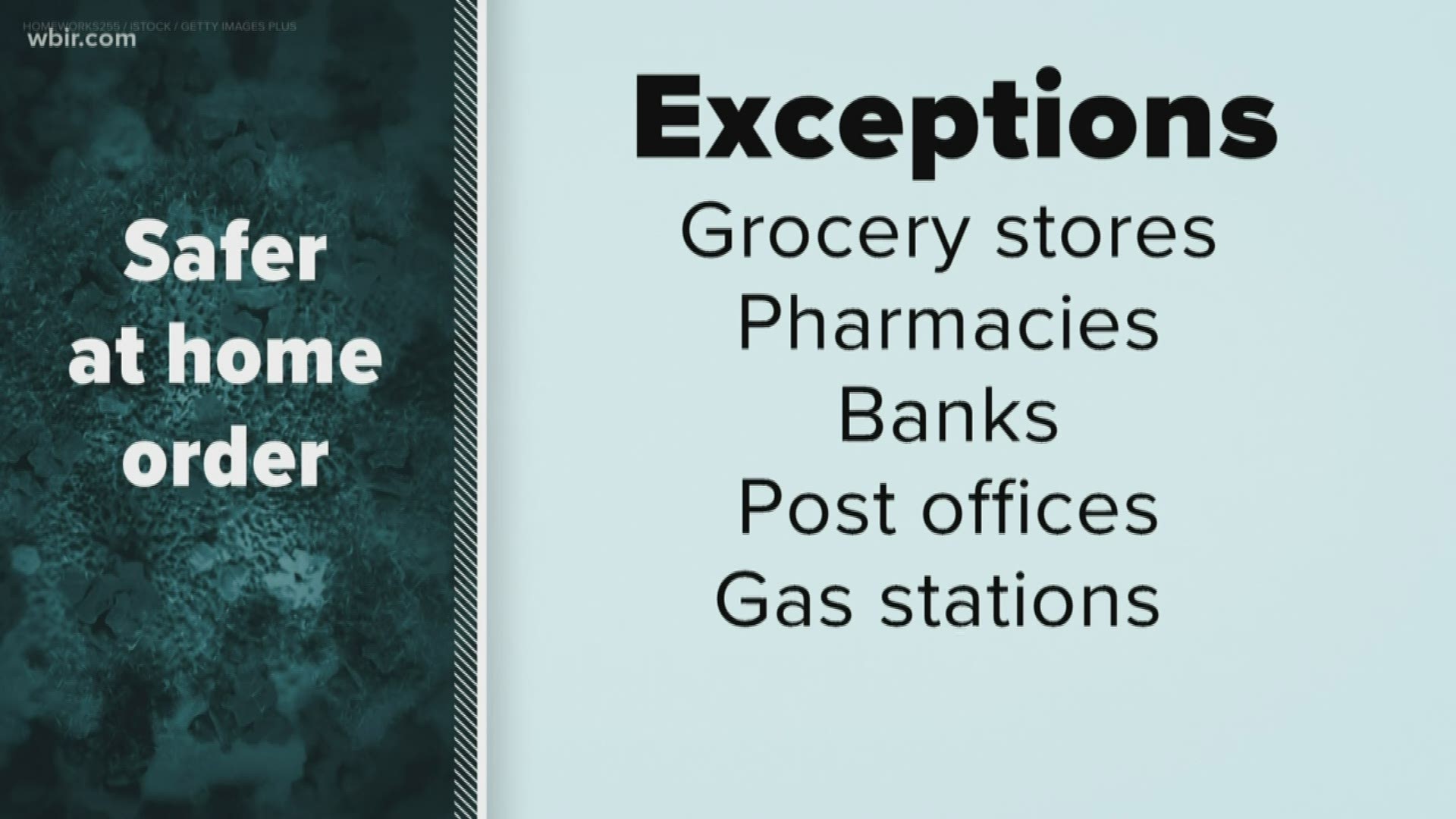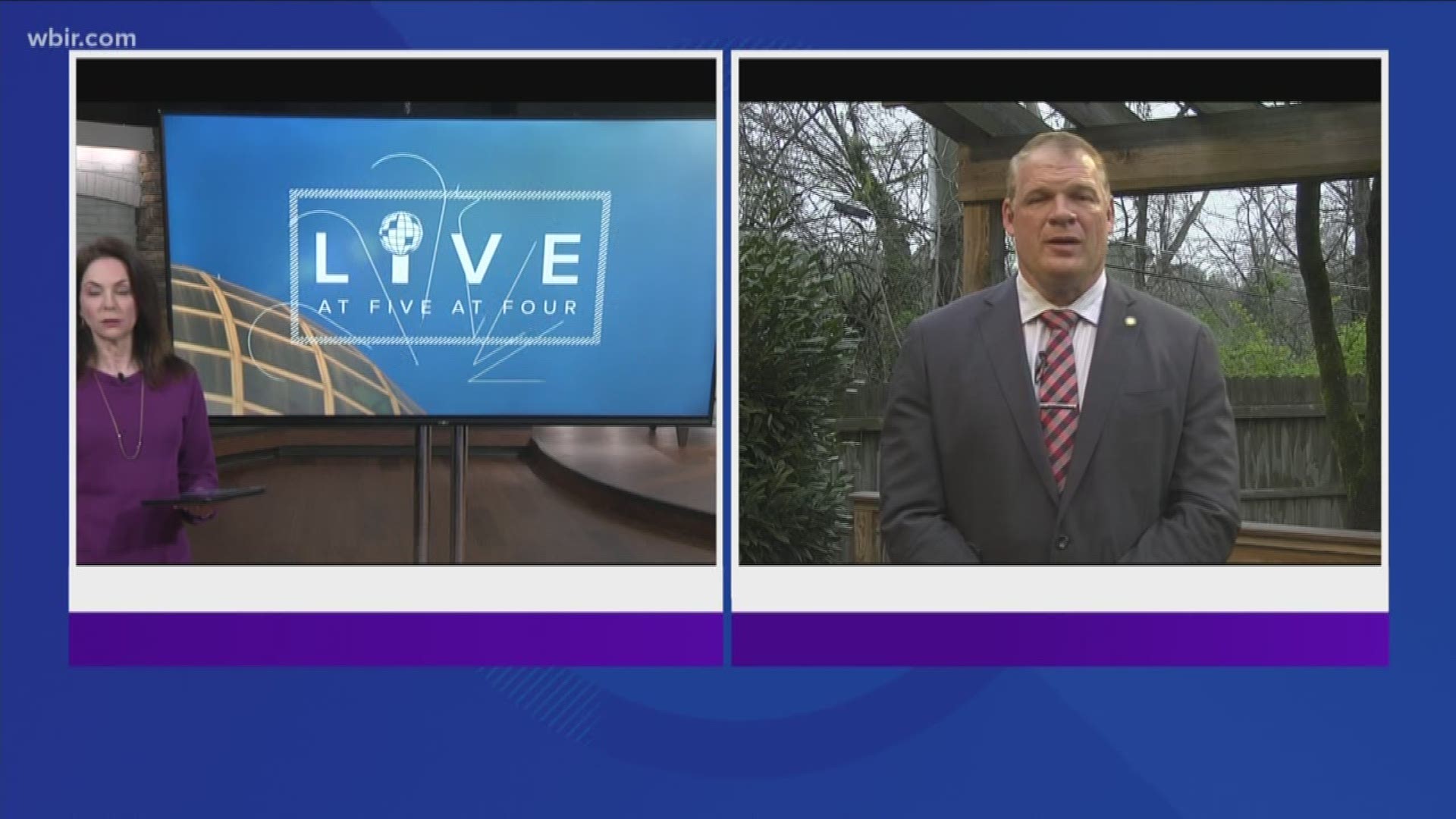KNOXVILLE, Tenn. — On Monday, Tennessee Governor Bill Lee issued an executive order putting 'Safer at Home' rules into effect and ordering all non-essential businesses to temporarily close for public use through at least April 14.
A week before the Governor's order, the Knox County Health Department also issued a "Safer at Home" order, closing non-essential businesses and encouraging residents to stay home if possible, which went into effect on March 24.
The Knox County Health Department says this order directs that all Knox County residents stay inside immediately and limit all movement outside of their homes beyond what is necessary to take care of essential needs.
Many of you are asking for clarification on what businesses are essential and non-essential.
Here's the list, according to the Knox County Health Department and the State of Tennessee:
Non-essential businesses are those that are not performing essential services, including:
- On-site activities at hospitality, educational and entertainment venues, businesses and facilities that are directed to the public
- Personal appearance businesses including hair, nail, massage, tattoo, tanning, waxing, and other such facilities except when the service is medically necessary
- Public and private social clubs
A list of essential businesses that will stay open include:
- Federal and state offices and services, including post offices and airports
- Essential government operations, such as law enforcement, transport and businesses that provide government programs and services
- Food and beverage: grocery and beverage stores, farmers markets, food banks, catering, convenience stores selling food, agriculture, food processing, feed mills and other businesses supporting the food supply
- Health care, mental and behavioral health, and biomedical research and businesses that support the healthcare industry, including health information technology
- Infrastructure operations, such as construction on hospitals, essential services and housing, building management and maintenance, and road work
- Sanitation and waste removal businesses and services
- Energy, water and sewage businesses and services
- Critical trades such as plumbing, HVAC, moving and relocation, and pest control
- Pharmacies and medical supply businesses, other businesses that directly support the drug and medical supply pipeline
- Vehicle fuel, support, service stations and businesses
- Banks, savings and loans, insurance companies and other businesses that directly support the financial sector
- Legal and judicial services, accounting, insurance and real estate
- Media, including newspapers, books, television, radio and other media services related to supply chain operations
- Home and business repair, hardware supply
- Transportation services, such as ride-share services, taxis, vehicle rental, and other essential public and private transportation necessary for essential activities
- Laundromats, dry cleaners, and industrial laundry services
- Warehousing and storage
- Manufacturing, distribution, and those essential for supply chain operations
- Daycare and childcare business will remain open but will prioritize children of parents working in essential services
- Home-based care for adults, seniors, children, and those with disabilities
- Hotels and commercial lodges will remain open specifically for lodging but will end entertainment or dining services in restaurants or group settings
- Housing and rental services may continue, but agents should practice social distancing, hold no open houses or gather in groups larger than 10
- Residential facilities, shelters, charitable and social services, such as those who provide necessities for the economically disadvantaged and others in need
- Religious and ceremonial functions such as weddings and funerals, provided they are following social distancing and health guidelines 'to the greatest extent practicable.' Churches are recommended to conduct regular services and gatherings online
Gov. Lee's order also allows businesses or organizations to stay open that can operate safely at all times with 10 people or fewer on the premises, which includes both employees, customers and visitors -- provided they follow health guidelines at all times.
The Knox County Health Department says that local businesses with questions can call 311 for more information.
Here are some essential tasks that you can do during the "Safer at Home" order:
1) Go to the grocery, convenience, warehouse store
2) Go to the pharmacy to pick up medication or other healthcare necessities
3) Go to medical appointments (call health provider first)
4) Go to a restaurant for takeout, delivery or drive-thru only
5) Take a walk, bike ride, etc (must be 6 feet apart, however)
6) Walk your pet or take them to the veterinarian
7) Receive deliveries from any business that delivers
Here are some non-essential tasks you should avoid during the "Safer at Home" order:
1) Go to work unless you are providing essential services as defined by this Order
2) Visit friends and family if there is no urgent need
3) Maintain less than 6 feet of distance from others when you go out
4) Visit loved ones in the hospital, nursing home, skilled nursing facility or other residential care facilities, except for limited exceptions as provided on the facility websites.
Is this Order mandatory? What happens if I don’t comply?
According to the Knox Co. Health Dept., though this is not a criminally enforceable order, for industries public health has regulatory authority over, KCHD's Environmental Health team will be performing spot checks for compliance. For other businesses we are relying on business owners to do the right thing and follow the order.


